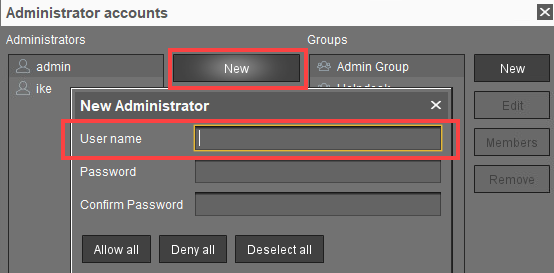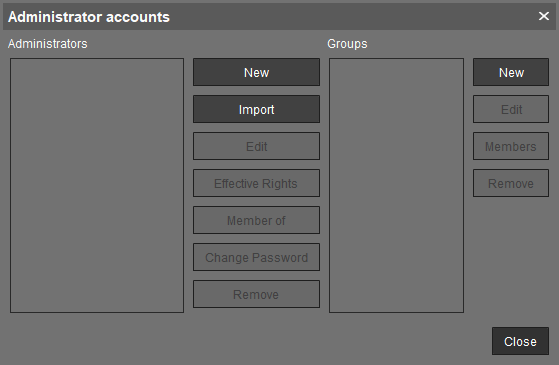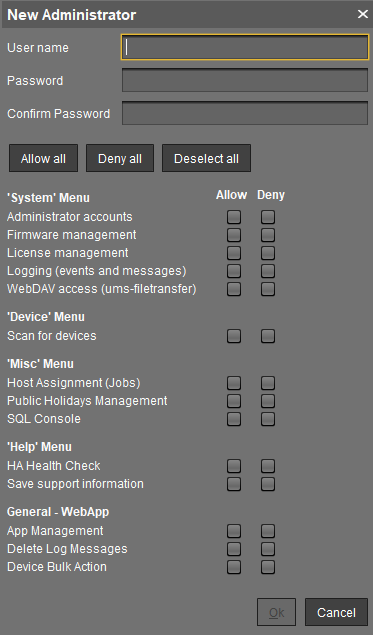General Administrator Rights in IGEL UMS
An administrator can grant himself and others rights, take away those rights, and set up new accounts in the IGEL Universal Management Suite (UMS).
Menu path: Menu bar > System > Administrator accounts
The following options are available here, split according to administrators or groups:
New: A new administrator or a new group will be created.
The following characters are not allowed for user names of UMS administrators: "/ \ [ ] : ; | = , + * ? < >

Import
A user will be imported from the AD/LDAP directory.
This procedure requires an AD/LDAP connection. For further details, see Importing Active Directory users.
Domain: Domain in which the AD/LDAP service runs
User: Name of the user
Password: Password of the user
Edit
Existing administrator or group settings can be edited.
Effective Rights
A list of all assigned rights for a specific administrator is shown.
Member of / Members
The assignment of memberships and groups is shown.
Change Password
Changes an administrator password.
Remove
Removes a highlighted administrator or a group.

Below, you will find a list of permissions that can be given to individual administrators or groups under System > Administrator accounts > New or Edit. Each permission has three possible states: not set, Allow or Deny.

'System' Menu
Administrator accounts
☑ The management of permissions can be performed: administrators and groups, as well as their rights, can be added and edited.
Administrator accounts permission should only be granted to users who are to have full access to all objects and actions in the UMS!
Firmware management
☑ Firmware versions can be imported, exported, and removed from the database.
License management
☑ IGEL firmware licenses can be allocated to devices.
Logging (events and messages)
☑ The event and message log may be viewed if Logging is enabled.
WebDAV access (ums-filetransfer)
☑ The user is authorized to add, modify, and delete files in the directory /ums_filetransfer/.
'Devices' Menu
Scan for devices
☑ The network can be scanned for devices, for example, if they are to be registered on the UMS Server.
'Misc' Menu
Host Assignment (Jobs)
☑ Scheduled jobs can be assigned to various hosts.
Public Holidays Management
☑ Public holidays can be defined to plan jobs.
SQL Console
☑ The SQL Console may be run. Warning: The SQL Console can cause considerable damage to the database.
'Help' Menu
HA Health Check
☑ The UMS HA Health Check - Analyse Your IGEL UMS High Availability and Distributed UMS Systems feature for an overall check of the High Availability environment can be used.
Save support information
☑ Database and server log files can be exported for support purposes.
General - WebApp
App Management
☑ The Apps area of the UMS Web App is displayed. The user is authorized to manage apps.
Delete Log Messages
☑ Log messages can be deleted with the UMS Web App.
Device Bulk Action
☑ Actions can be performed for any number of devices with the UMS Web App, e.g. by using directories.
☐ With the UMS Web App, actions can only be performed for one device at a time.
This only applies to the UMS Web App; bulk actions can still be performed from the UMS Console.
